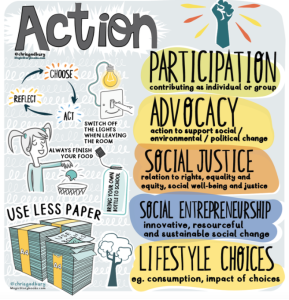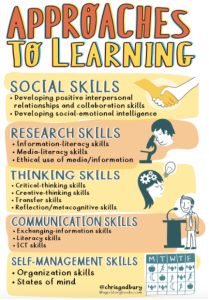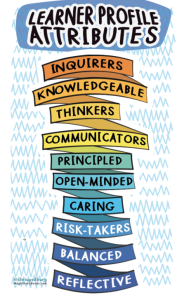5 Tips for IB Adults
February 3, 2022 - 7 minutes readEcole Cedardale, Cypress Park Primary, and West Bay Elementary were pleased to host a parent information session recently on supporting your IB Learners. We were happy to see so many keen families looking for ways to deepen and support the learning we do in our schools.
I will attempt to summarize the presentation here.
- Capitalize on the Small Moments
Some of the best learning and conversations occurs when we least expect them, but sometimes we can help facilitate them when we have a few tools in our pocket. Thinking about all the small moments we have with our children; out walking the dog, driving to soccer practice, baking cookies together, what can we as parents do to facilitate some of those IB skills? Firstly, notice and wonder  aloud. “I wonder about that unusual looking fungus growing on the tree?” When we look closely at the world around us and start to wonder we model curiosity. After you have noticed something, ask questions. Great questions are open-ended questions that don’t always have an answer. Some ways to start a question are “How might…? How does…? Why do you think…?” and then see where that takes you.
aloud. “I wonder about that unusual looking fungus growing on the tree?” When we look closely at the world around us and start to wonder we model curiosity. After you have noticed something, ask questions. Great questions are open-ended questions that don’t always have an answer. Some ways to start a question are “How might…? How does…? Why do you think…?” and then see where that takes you.
Knowing the unit of inquiry that your child is studying (or has studied) is also a great way to enter into a conversation. For example, if you and your children were cooking together there are numerous ways to connect to different topics and units. In thinking of cooking some of the potential connections could include:
-
-
-
-
- -Measurement and math
- -Science and chemistry
- -Cultural significance
- -Changes over time
- -Sequencing of events
- -Supply and demand of resources
- -Environmental impacts
-
-
-
Over time and with practice you and your child will find these conversations feel more natural and authentic. Being mindful of these opportunities is a great first step.
- Show Instead of Do
We are all guilty of this from time to time…it’s just easier for me to do it than wait for my child to fumble around with whatever the task may be. It is in the fumbling around however, that our children learn and become proficient. They also become more confident, independent, and capable. It can be the small things, like teaching them how to zip a zipper or put on their own backpack or the bigger things like taking the bus, ordering their own meal, or reserving books from library. It may take a little longer and they might not get it right each time, but the gift of show instead of tell lasts a lifetime.
These five skills (social, research, thinking, communication and self-management) are foundational to the IB programme. How could you help develop these skills in the activities you do with your child? Think about what skills are involved when playing a board game as a family or watching a movie (or better yet a documentary). When planning your next family vacation how could you involve your child in the process and help them to develop these skills? Seek out opportunities to build these skills and notice and name them for your child.
- Take Action
 As you start to have more and more conversations about your child’s learning and are looking closely and asking more questions, think about ways you and your child can start to take action. For example, when you were baking and perhaps started talking about where food comes from maybe the conversation led to sustainable farming. Perhaps this led to a discussion about free-range eggs or eating less animal products. Making life-style choices is one way your child could take action. Taking action has many forms and is our ultimate goal as an IB learner. Please share with your child’s teacher any action they are taking, we want to hear about it and celebrate it.
As you start to have more and more conversations about your child’s learning and are looking closely and asking more questions, think about ways you and your child can start to take action. For example, when you were baking and perhaps started talking about where food comes from maybe the conversation led to sustainable farming. Perhaps this led to a discussion about free-range eggs or eating less animal products. Making life-style choices is one way your child could take action. Taking action has many forms and is our ultimate goal as an IB learner. Please share with your child’s teacher any action they are taking, we want to hear about it and celebrate it.
The IB Programme uses a lot of sophisticated language and sometimes it can be confusing. Our students become accustomed to the IB vocabulary as it is used and taught by all the staff at our school. When parents begin to use the language at home, it increases everyone’s understanding and the benefits increase. An easy place to start is with our learner profile and as you become more comfortable with that, begin to work in the Approaches to Learning. A simple and effective way to talk the talk is when you are looking to praise your child for example; “Wow, thank you for being so open-minded by trying that new food at Grandma’s house.” Or, “What a risk-taker you were at practice today by volunteering to go first.” And even, “You really showed great social skills today when you took turns with the video game.”
The International Baccalaureate aims to develop inquiring, knowledgeable and caring young people who help to create a better and more peaceful world through intercultural understanding and respect. When home and school work together we are sure to reach this goal.
Thank you so much to Mrs. Morikke Espenhain and Ms. Kristina Hayes for hosting our parent evening and putting together these tips.


Recent Comments